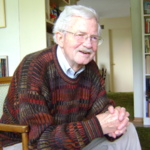Interviewer: Sandi Bean and Liz Hill
Interview Date: January 26, 2010
Location: Hovland residence, Corvallis, Oregon
Duration: 0:52:33
The interview opens with Warren Hovland describing his early life and his family’s Scandinavian background. He notes that his father was very religious and very conservative, which influenced Hovland to take a religious studies approach to his education. He served in World War II for three years as a Navy chaplain. Prior to joining the military, he had done a bachelor’s of divinity at Yale Divinity School. Following the war, he returned to Yale to pursue a doctoral degree. As he was finishing the program, he attended a conference that Oregon State College President A.L. Strand was also attending, and Strand offered him a job at OSU. He met his wife at a New Year’s Eve party and they were married in 1950. He then briefly describes his recollections of the Great Depression and the Civil Rights movement.
At Oregon State, Hovland served in the faculty senate and was appointed to the Goals Commission. He spent his career at OSU working to strengthen the liberal arts program and trying to bring talented scholars to the university. He also continued his own research on world religions and religious movements. During his career at OSU, he took two sabbaticals to Yale, one to Harvard, and one to Germany, in support of his research on religion. He also mentions some of the papers he has written, including a chapter for the book Pagan and Christian Anxiety. He then stops the interview briefly to get out the coffee and chocolate chip cookies he had prepared for the interviewers.
From there, Hovland talks about the climate of the university and the termination of the religious studies program shortly after he retired. He also talks about one of his favorite courses to teach, bioethics, which he co-taught with a local expert for eighteen years. He then describes his children’s accomplishments and his grandson. He segues into a short discussion about politics, mentioning that he is happy that Obama was elected president but that the country still has a long way to go in terms of health care and the operation of Congress. He expresses the sentiment that hope lies in education, and lists many things that he has been grateful for throughout his life.
C. Warren Hovland was born in Chicago, Illinois in 1918. He grew up in a multilingual community, and his own mother was a Swedish immigrant, so he was exposed to a variety of linguistic and cultural practices from a young age. He attended Lawrence College in Appleton, Wisconsin with the intention of becoming a Lutheran minister, but changed his mind and transferred to Boston University and then Yale Divinity School before being ordained in the Congregational Church and enlisting in the U.S. Navy as a chaplain during World War II. He later received a doctoral degree from Yale Divinity School, and was offered a job at Oregon State College in the religious studies department by then-president August Strand. During his career at OSU, Dr. Hovland was instrumental in strengthening the university’s liberal arts curriculum, so much so that a campus building was named after him. He retired from OSU in 1987 and passed away in 2015.
Dublin Core
Title
Description
At Oregon State, Hovland served in the faculty senate and was appointed to the Goals Commission. He spent his career at OSU working to strengthen the liberal arts program and trying to bring talented scholars to the university. He also continued his own research on world religions and religious movements. During his career at OSU, he took two sabbaticals to Yale, one to Harvard, and one to Germany, in support of his research on religion. He also mentions some of the papers he has written, including a chapter for the book Pagan and Christian Anxiety. He then stops the interview briefly to get out the coffee and chocolate chip cookies he had prepared for the interviewers.
From there, Hovland talks about the climate of the university and the termination of the religious studies program shortly after he retired. He also talks about one of his favorite courses to teach, bioethics, which he co-taught with a local expert for eighteen years. He then describes his children’s accomplishments and his grandson. He segues into a short discussion about politics, mentioning that he is happy that Obama was elected president but that the country still has a long way to go in terms of health care and the operation of Congress. He expresses the sentiment that hope lies in education, and lists many things that he has been grateful for throughout his life.
C. Warren Hovland was born in Chicago, Illinois in 1918. He grew up in a multilingual community, and his own mother was a Swedish immigrant, so he was exposed to a variety of linguistic and cultural practices from a young age. He attended Lawrence College in Appleton, Wisconsin with the intention of becoming a Lutheran minister, but changed his mind and transferred to Boston University and then Yale Divinity School before being ordained in the Congregational Church and enlisting in the U.S. Navy as a chaplain during World War II. He later received a doctoral degree from Yale Divinity School, and was offered a job at Oregon State College in the religious studies department by then-president August Strand. During his career at OSU, Dr. Hovland was instrumental in strengthening the university’s liberal arts curriculum, so much so that a campus building was named after him. He retired from OSU in 1987 and passed away in 2015.

